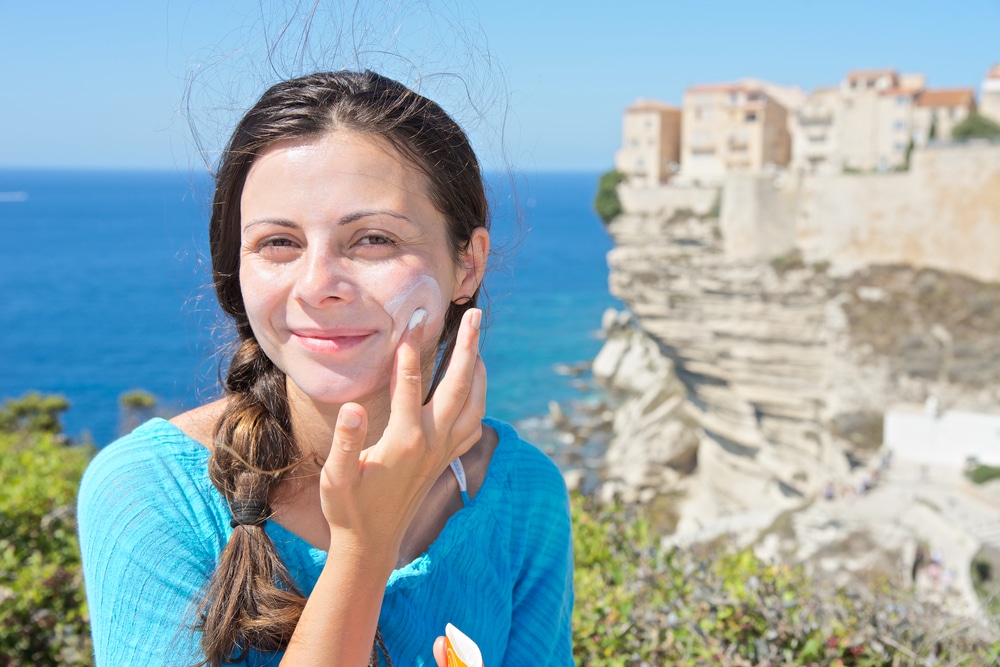As with making any good habit stick, there's a small learning curve when it comes to optimizing how you protect your skin from the sun's ultraviolet (UV) rays. This may include choosing the right sunscreen and learning best practices for application and use. For example, can you use face sunscreen on your body?
With so many types of sunscreen to choose from—face, body, stick, spray, lotion, mineral, chemical—using one sunscreen product from head to toe may seem like the simplest option. But facial skin is distinct from the skin on the rest of your body, and sunscreen formulas often cater to those differences. Here's when it makes sense to use the same sunscreen all over versus when you should opt for a more tailored sun care product.
The Difference between Face and Body Sunscreen (and Skin)
Separate sunscreens for your face and body exist because your facial skin may have unique needs and characteristics.
Skin Sensitivity
Facial skin is thinner than the skin on the rest of your body, with the thinnest skin around your eyes and eyelids. Likely due to its thinner composition (and because it's often uncovered), the skin on your face is also more prone to sensitivity and likely to show signs of aging the fastest. As you get older, your facial skin becomes less efficient at holding moisture and more susceptible to wrinkles and dark spots, which sun exposure exacerbates.
Skin Conditions
Some skin conditions are also more concentrated on the face. For example, while you can get blemishes on your back, shoulders, or chest, facial acne outbreaks are the most common. Because of this, facial sunscreen is more likely to be oil-free, contain noncomedogenic ingredients (ingredients that don't clog pores), or have a more lightweight texture.
Other skin challenges, like rosacea, usually only affect the skin on your face. So face sunscreens for rosacea, for example, may contain ingredients that soothe sensitive skin and balance redness.
Targeted Formulas
Facial sunscreens may have higher SPFs and use extra-gentle ingredients to account for the thin skin barrier. They may also contain active ingredients typically found in facial skin care products, like serums and moisturizers, to address common skin concerns. For example, EltaMD UV Clear Broad-Spectrum SPF 46 includes Hyaluronic Acid to reduce dryness and Vitamin E to fight free radicals for diminished visible signs of aging.
Ultimately, the skin on your face has more targeted needs, and facial sunscreens are specifically formulated to meet them. So, can you use face sunscreen on your body? You certainly can. (But you may not want to use body sunscreen on your face.) Keep in mind that facial sunscreens are smaller in size since they're designed to cover a smaller area, so you'll get fewer applications if you use them on your body, too.
Choosing a Sunscreen for Your Face and Body
The difference between face and body sunscreen formulas is that they can help you achieve your skin goals in distinct ways—but they're both formulated to protect you from UV rays. The American Academy of Dermatology has three simple recommendations for choosing a sunscreen. Considerations beyond these recommendations can depend on your skin type, skin concerns, and personal preferences. At minimum, your sunscreen formula should:
- Be water-resistant
- Offer broad-spectrum protection
- Have SPF 30 or greater
From there, choosing a face sunscreen that's suitable for your skin type will make it an even better fit. If you have oily or acne-prone skin, opt for oil-free formulations made without pore-clogging ingredients. If you have dry or sensitive skin, look for a restorative formula that contains moisturizing and soothing ingredients to avoid disrupting an already delicate skin barrier.
Having a variety of sunscreen products depending on your needs has perks. Still, having a formula that works for both face and body can be convenient. EltaMD UV Sheer Broad-Spectrum SPF 50+ is a good option for both body and face since it's suitable for all skin types and absorbs quickly into the skin—meaning it's less likely to stain your clothes or mess up your makeup.
Solidifying Your Healthy Skin Routine
After a day of fun in the sun, you're bound to have a layer of sunscreen on your skin. Remember to remove any residue at the end of the day to keep your skin clear and radiant. Water-resistant sunscreen can be stubborn when it comes time to wash your face, so try a double cleansing technique to reset your skin before starting fresh the next day.
